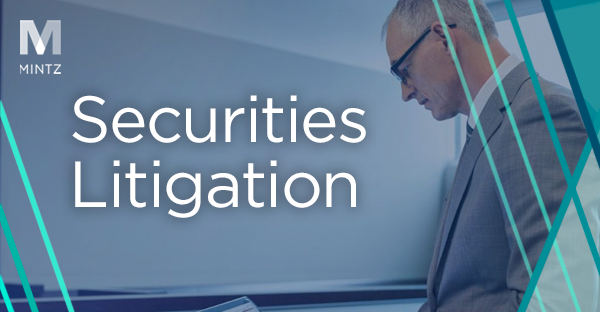
Securities Litigation
Viewpoints
Filter by:
Massachusetts Securities Division Rolls Out Final Version of Fiduciary Duty Rule
March 3, 2020 | Blog | By Pete Michaels, Michael Pastore, Jason Burrell
The Massachusetts Securities Division (the “Division”) has announced that they will begin to apply a fiduciary conduct standard to broker-dealers and agents when dealing with their customers.
Read more
Second Circuit Summarily Affirms the Attorneys’ Fees Award in the Foreign Exchange Antitrust Settlement after District Court Rejects Class Counsel’s Side Deal with the Objector
December 2, 2019 | Blog | By Joel Rothman
On November 1, 2019, the United States Court of Appeals for the Second Circuit issued a summary order rejecting the appeal of an objector to the Foreign Exchange Antitrust Settlement. A few weeks earlier, U.S. District Court Judge Schofield had denied a motion filed by the objector and class counsel seeking an “indicative ruling” on their combined motion for approval of an agreement that would have ended the appeal. These two decision clear the way for the remaining distribution from the settlement fund, which totaled over $2.3 billion dollars.
Read more
Connecticut Court Says Intervention Is One Way To Preserve Putative Class Member's Right To Opt Out
October 10, 2019 | Blog | By Ellen Shapiro
Last week, the district court entered an order, granting CalSTRS’ motion for intervention for the limited purpose of tolling the statute of repose. While there is no longer a risk that the complaint will be dismissed (the vast majority of Plaintiffs’ claims have since survived dismissal), CalSTRS has successfully preserved its right to opt out if a class is certified. Allowing CalSTRS (and others) to use motions to intervene to toll the statute of repose rather than forcing such putative class members to choose to forego their rights or file their own opt-out action may preserve resources and encourage efficiency of the courts.
Read more
Judge Rakoff Unseals Documents in Petrobras Securities Class Action To Allow Use in Foreign Arbitration, Bypassing Traditional Requirements of 28 U.S.C. § 1782
August 14, 2019 | Blog | By Ellen Shapiro
Years after Plaintiffs brought a federal securities complaint against Petrobras, and more than a year after the case settled for approximately $3 billion, Judge Jed S. Rakoff of the United States District Court for the Southern District of New York ordered the unsealing of the majority of documents attached to parties’ summary judgment papers. Cornell University intends to use these documents in an arbitration in Brazil. Not only does Judge Rakoff’s decision come as an important reminder that sealing orders are not intended to last forever, but this decision also demonstrates how a motion to unseal may be used to bypass the traditional requirements of 28 U.S.C. § 1782, frequently invoked by entities seeking to use U.S. discovery in foreign proceedings.
Read more
Supreme Court Denies Opportunity To Clarify Whether The Federal Securities Laws Carry a Duty to Update
May 22, 2019 | Blog | By Ellen Shapiro
The U.S. Supreme Court denied defendants-appellees’ petition for certiorari in Hagan v. Khoja. As set forth in our prior alert, the executives of the now-defunct biotechnology company, Orexigen, sought review of a Ninth Circuit decision, which not only created a departure from other courts in its narrow-approach to incorporation by reference and judicial notice, but according to the petition, also distinguished itself by being the first Circuit Court of Appeal to find that an issuer owes a duty to update a statement of historical fact that was accurate when made. At issue was whether Orexigen had a duty to disclose data that demonstrated interim results from an obesity drug trial were not as promising as once touted. In opposition to the petition for certiorari, respondent argued, inter alia, that “[e]ven if petitioners were correct . . . that this case implicates whether companies have a duty to update earlier statements of historical fact, the interlocutory posture of this case would make it the worst kind of vehicle for considering that question.”
Read more
Tenth Circuit Affirms Extraterritorial Reach of SEC Enforcement of the Federal Securities Laws
April 25, 2019 | Blog | By Alain Mathieu, Joel Rothman
In the Traffic Monsoon litigation, the U.S. Court of Appeals for the Tenth Circuit held that the enforcement provisions of the Securities Act and the Exchange Act reach Traffic Monsoon’s sales to customers outside of the United States. The implications of this decision are significant. This is the first Circuit Court decision to interpret Section 929P(b) of Dodd-Frank, and the first to adopt the position that Dodd-Frank limited Morrison’s application to allow for the enforcement provisions of the 1933 and 1934 Acts to apply extraterritorially. As a result, the decision may result in future decisions by the SEC to allow for holders of common shares to be eligible for recovery in connection with fair funds, rather than limiting eligible parties to holders of shares of American Depositary Shares or Receipts (ADR’s), a limitation the SEC imposed in the Fair Fund established for investors in BP. Recently, Traffic Monsoon has requested a stay of the Tenth Circuit's mandate while it prepares a writ of certiorari to the Supreme Court.
Read more
Teva Putative Federal Securities Class Member Seeks to Toll Statute of Repose with Motion to Intervene
March 12, 2019 | Blog | By Kevin Mortimer, Ellen Shapiro
The United States District Court of the District of Connecticut will soon decide whether a putative class member may intervene “for the limited purpose of tolling the statute of repose.” Statutes of repose place an outer limit on when a claim can be brought. For example, claims brought under Sections 11 and 12 of the Securities Act of 1933 are subject to a 3-year statute of repose, 15 U.S.C. § 77m, and claims brought under Sections 10(b) and 20(a) of the Securities Exchange Act of 1934 are subject to a 5-year statute of repose. 15 U.S.C. § 1658. Less than two-years ago, the U.S. Supreme Court held that unlike statutes of limitations, which may be tolled by the pendency of a class action, statutes of repose cannot be so equitably tolled. CALPERS v. ANZ Securities. Should the District Court deny the motion, the putative class member, who purchased millions of Teva shares during the proposed class period will be time-barred from opting-out of the securities class action at-issue or asserting its own claims should the action be dismissed.
Read more
Petition for Certiorari Asks Supreme Court to Clarify Whether the Federal Securities Laws Carry a Duty to Update
February 14, 2019 | Blog | By Ellen Shapiro
Last week, executives of the now-defunct biotechnology company, Orexigen filed a petition for certiorari before the U.S. Supreme Court, seeking clarification of the duty to update under the federal securities laws. The petition seeks further review of a recent decision by the Ninth Circuit, Khoja v. Orexigen Therapeutics, Inc., 899 F.3d 988 (9th Cir. 2018), which not only created a departure from other courts in its narrow-approach to incorporation by reference and judicial notice, but according to Orexigen, also distinguished itself from other Circuit Courts by being the first Circuit Court to find that an issuer owes a duty to update a statement of historical fact that was accurate when made. Specifically, the Ninth Circuit held that “by touting and publishing the ‘surprisingly’ positive 25 percent interim results [of the drug at-issue’s ability to decrease cardiovascular events], Orexigen created its own obligation to report that those results did not pan out after all” as evidenced by the 50 percent interim results.
Read more

In Khoja, the Ninth Circuit Limits Defendants’ Ability to Argue Facts in a Motion to Dismiss
September 18, 2018| Blog|

Ninth Circuit Holds Transactions in Unsponsored ADRs Can Be “Domestic” Under Morrison
August 14, 2018| Blog|

Volkswagen Bondholders Reliance Allegations Come Under Scrutiny
May 25, 2018| Blog|

Canadian Court Limits Underwriters’ Liability and Susceptibility to Class Treatment
March 23, 2018| Blog|
Explore Other Viewpoints:
- Antitrust
- Appellate
- Arbitration, Mediation & Alternate Dispute Resolution
- Artificial Intelligence
- Awards
- Bankruptcy & Restructuring
- California Land Use
- Class Action
- Complex Commercial Litigation
- Construction
- Consumer Product Safety
- Cross-Border Asset Recovery
- Debt Financing
- Direct Investing (M&A)
- Diversity
- EB-5 Financing
- Education & Nonprofits
- Employment
- Energy & Sustainability
- Environmental Enforcement Defense
- Environmental Law
- FDA Regulatory
- Federal Circuit Appeals
- Financial Institution Litigation
- Government Law
- Growth Equity
- Health Care
- Health Care Compliance, Fraud and Abuse, & Regulatory Counseling
- Health Care Enforcement & Investigations
- Health Care Transactions
- Health Information Privacy & Security
- IP Due Diligence
- IPRs & Other Post Grant Proceedings
- Immigration
- Insolvency & Creditor Rights Litigation
- Institutional Investor Class Action Recovery
- Insurance & Financial Services
- Insurance Consulting & Risk Management
- Insurance and Reinsurance Problem-Solving & Dispute Resolution
- Intellectual Property
- Investment Funds
- Israel
- Licensing & Technology Transactions
- Life Sciences
- Litigation & Investigations
- M&A Litigation
- ML Strategies
- Medicare, Medicaid and Commercial Coverage & Reimbursement
- Mergers & Acquisitions
- Patent Litigation
- Patent Prosecution & Strategic Counseling
- Pharmacy Benefits and PBM Contracting
- Portfolio Companies
- Privacy & Cybersecurity
- Private Client
- Private Equity
- Pro Bono
- Products Liability & Complex Tort
- Projects & Infrastructure
- Public Finance
- Real Estate Litigation
- Real Estate Transactions
- Real Estate, Construction & Infrastructure
- Retail & Consumer Products
- Securities & Capital Markets
- Securities Litigation
- Special Purpose Acquisition Company (SPACs)
- Sports & Entertainment
- Strategic IP Monetization & Licensing
- Tax
- Technology
- Technology, Communications & Media
- Technology, Communications & Media Litigation
- Trade Secrets
- Trademark & Copyright
- Trademark Litigation
- Value-Based Care
- Venture Capital & Emerging Companies
- White Collar Defense & Government Investigations
- Women's Health and Technology






